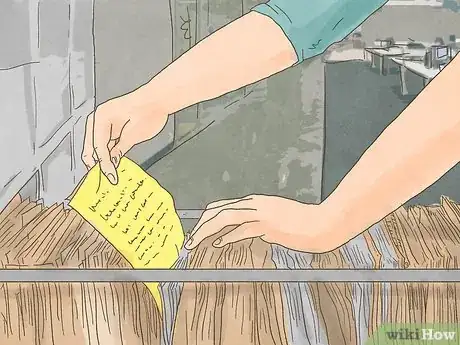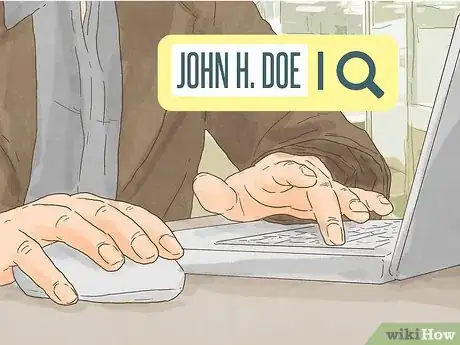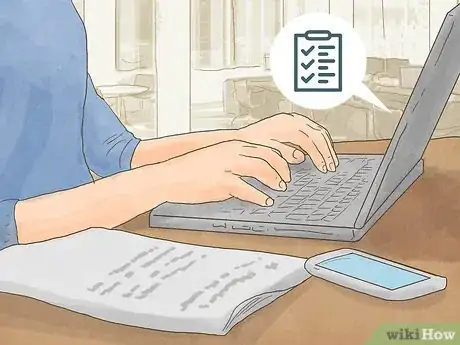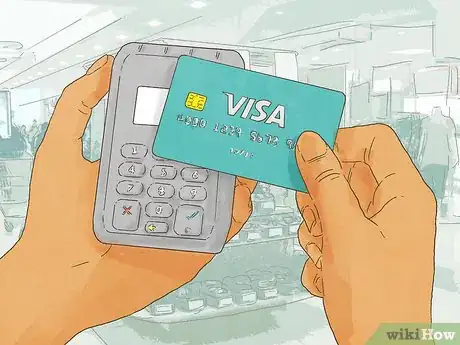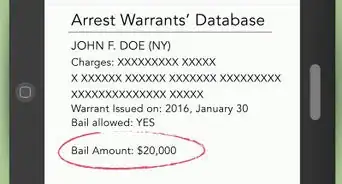This article was co-authored by Clinton M. Sandvick, JD, PhD. Clinton M. Sandvick worked as a civil litigator in California for over 7 years. He received his JD from the University of Wisconsin-Madison in 1998 and his PhD in American History from the University of Oregon in 2013.
There are 9 references cited in this article, which can be found at the bottom of the page.
This article has been viewed 34,754 times.
There are several ways that a warrant could be issued for your arrest and you may not know about it. Some warrants are issued because the police believe they have evidence of a crime, but more warrants are issued for civil (non-criminal) matters. Reasons a warrant has been issued could include unpaid fines or court fees, issues related to parole or probation, or child support obligations.[1] It is even possible, though unlikely, for a warrant to be issued by mistake. In any case, if a warrant is issued and you are not aware of its existence, then you risk being arrested at any time without warning. You need to know that there are several ways you can check the official records anonymously to find out about any warrants.
Steps
Using Official Sources to Search for Outstanding Warrants
-
1Look for official government websites. The Internet is going to be your best tool for searching warrant records. If you have a location in mind where you would most expect the warrant to exist, you can search for that city, county or state’s official website.[2]
- Official government sites typically end in .gov or .us. The information on these sites is generally kept very current, and you can search anonymously.[3]
- For example, in Florida, you can search the Florida Crime Information System Public Access Center. That site asks you to provide the name, race, gender and birth date (if available) for the person you are searching.
- The Maryland Department of Public Safety and Correctional Services maintains a website at www.dpscs.maryland.gov. At that site, you can find information about outstanding violation warrants for parole violations or the “most wanted” list.[4]
-
2Contact a court clerk directly and anonymously. If you cannot find a searchable online database that contains the information you seek, you may try calling the court clerk directly. When you call, if you have a specific case number to reference, that may assist the search. If not, you can just ask the clerk to search for any outstanding warrants for any name. You may do this anonymously and just ask, “Will you search for any outstanding warrants on record for John Smith?”[5] You may need to specify whether you are interested in criminal, civil, or both.
- Criminal warrants are a matter of public record, and you should be able to get the information whether you are calling for yourself or about someone else. Some civil matters are more confidential and may not be available over the phone.
- You will need to have some idea of the area where a warrant may have issued. State courts are generally divided by county or into circuits. You can look up the state’s official court website to get telephone contact information for any given county or circuit.
- Be aware that the courts or police could trace a telephone call and use the information to locate and arrest you. If you are truly concerned about your anonymity, you could call from a public phone, or ask a friend to make the call for you.[6]
Advertisement -
3Search the public records at the courthouse. Many courts offer public access computer terminals that will allow you to search the court’s own records for outstanding warrants. Courts are public buildings that you can enter without having to show identification. Similarly, you will be allowed to use the search terminals without having to identify yourself. You can search the records by name or by case number, if you have one.[7]
- If you are truly concerned for your anonymity, you may wish to have someone else visit the court and conduct the search for you. If an arrest warrant is outstanding, you risk being taken into custody if you are recognized by a court officer.
Protecting Your Anonymity
-
1Limit your search to official sites. Official warrant search sites, whether sponsored by a court or by a law enforcement branch, generally do not ask for your identification in order to conduct a search. You do need to enter the name and other identifying information of the person you are searching for, but you do not need to need to identify yourself as the person conducting the search. The court cannot infer that the person conducting the search is the same as the person being searched.
- By contrast, many of the online, commercial sites require you to provide your credit card or your own residential address in order to conduct a search. Although the companies suggest that your search will be anonymous, the information that you provide online is not protected by any legal privilege and could be obtained by law enforcement agencies.[8]
-
2Work with an attorney. If you believe that a criminal warrant may exist for your arrest, you may wish to work with an attorney. In addition to advising you on the legal issues involved, an attorney can anonymously conduct a search for you. The work that an attorney does on your behalf, such as contacting a police department or a court clerk's office, will be protected by the attorney/client privilege.
- For example, if your attorney calls the police department to check on any outstanding warrants for your arrest, the inquiry could make the police suspicious if they are looking for you. If the police ask your attorney to tell them how to find you, your attorney would respond that the information is privileged and cannot be disclosed.[9]
-
3Enlist help from a trusted friend or family member. If you are concerned about maintaining your anonymity, you may not want to visit the court or police department in person. In most cases, anyone can request information about outstanding warrants. You could ask a friend or family member to visit the court or police station on your behalf and ask for the information.
- Many court clerk's offices provide one or more computer terminals that are available for public use to check official records. Your friend can generally access these computers without providing any identification and then conduct the search individually.
- If anyone at the court should happen to ask your friend to provide information about your location, your friend is not required to do so. If asked, your friend should respond, "I don't believe I am required to provide that information for searching public records."
Searching Carefully on Commercial Sites for Outstanding Warrants
-
1Review online commercial search engines. If you conduct a general search on the Internet for the phrase "warrant search," you will find many third party commercial websites. These sites collect information from a range of publicly available sources about any individual that you wish to search. When you obtain the list of sites, you should check them to see what they claim and how wide their searches will be.[10]
- For example, the site SpyFly.com asserts that its site is "Completely Confidential and Anonymous" and that it searches "over a billion pieces of specific information."
- The site PublicRecordsReviews.com claims that "Warrant Lookup is available instantly. We allow you to search for free and to do unlimited searches on all records included in Warrant Lookup."[11]
-
2Read the disclaimer information carefully. Realize that the commercial search engines are in the business primarily to make money, not to provide a public service or source of information. As a result, you need to be careful about the information that you find. Do not act exclusively on information that you receive from commercial search engines.
- For example, the disclaimer on SpyFly.com says, "Please be EXTREMELY careful when reviewing a person's criminal history. Please DO NOT use this information without further investigating the accuracy of the information."
- The site InstantCheckmate.com contains a disclaimer that says, "The information available on our website may not be 100% accurate, complete or up to date, so do not use it as a substitute for your own due diligence."
-
3Begin your search by entering the person's name. Most commercial search engines will allow you to initiate your search with just the subject's name. In some cases, if you are not certain of the correct spelling, you are able to mark a box that indicates that the name is approximate, and the computer will conduct a broader search.
- For example, on the site InstantCheckmate.com, you can begin your search by entering only the subject's name. If you have a single state in mind, you can also select that to narrow the results that you will get.[12]
-
4Provide limiting information for better results. If you can narrow the search, your search is likely to result in more useful information. Some commercial sites will provide the opportunity for you to provide additional information. If you have the information available, your results will likely be more useful. This additional information could include any of the following:[13]
- court name
- case name, if applicable
- case number
- appearance of the individual
- last known residential address
-
5Conduct an advanced search, if available. An initial search, based only on name and state can result in as many as two or three dozen, or more, matches. On InstantCheckmate.com, for example, you will be offered the opportunity to conduct an advanced search. If you select this option, you will be prompted to provide a middle initial, current or previous city of residence, and the subject's age. Providing this added information will make your search more focused and more reliable.[14]
-
6Access your report. The initial level of searching on most commercial sites will provide you with just a list of names or places of residence that have turned up some information. You do not actually get to see the information from the public records. To see the report, you then need to choose one of the people from the list and click on "Show Report." This will then take a few minutes for the search engine to compile the actual report from the public records. During the process, you will see an update of the type of records being searched.
- For example, during a search on InstantCheckmate.com, the report shows your progress through "Popular Records," "Criminal and Arrest Summary," "Social Media Summary," "Relative Selector," and "State Records Summary."
-
7Choose to save your results. After the search is complete, you will be prompted to enter your name and email address if you wish to receive an electronic copy of the search results.
- Be aware that, on many sites, by providing your email address, you may be adding your name to an email list for that company.
-
8Provide payment information. On most sites, you are required to pay to see the final report. Payment is generally completed by providing a credit card number, along with your name, expiration date and security code. Some sites accept payment through PayPal as well.You will need to select a payment option from two or three different choices:
- Single fee for obtaining the single current report
- One month subscription fee
- Three month subscription fee
- You must read the disclaimer information carefully when making payment. On many sites, signing up for the subscription includes a recurring payment that will automatically deduct from your credit card each month, until you call to cancel.
-
9Verify the results with a follow-up search. The results that you obtain from commercial sites are not going to be as reliable as the information you would get directly from a court or law enforcement official site. The commercial sites are readily available and are quicker to use. However, after you get information from a commercial search engine, you should then visit the official governmental site and attempt to confirm the information.[15]
- For example, if an online search turns up a report of a warrant for unpaid child support in Oklahoma City, you could then call the court clerk in Oklahoma City. Ask directly, “I am calling to confirm some information. Do you have a record of an outstanding warrant for Mr. X (fill in the name)?”
References
- ↑ https://www.wklaw.com/difference-between-an-arrest-warrant-and-a-bench-warrant/
- ↑ http://criminal-law.freeadvice.com/criminal-law/arrests_and_searches/outstanding_warrants.htm#ixzz3NOeUb0ES
- ↑ http://thelawdictionary.org/article/best-way-to-run-a-free-arrest-warrant-check/
- ↑ http://dpscs.maryland.gov/publicinfo/DPP-violators/index.shtml
- ↑ http://criminal-law.freeadvice.com/criminal-law/arrests_and_searches/outstanding_warrants.htm#ixzz3NOeUb0ES
- ↑ http://thelawdictionary.org/article/best-way-to-run-a-free-arrest-warrant-check/
- ↑ http://criminal-law.freeadvice.com/criminal-law/arrests_and_searches/outstanding_warrants.htm#ixzz3NOeUb0ES
- ↑ http://www.americanbar.org/content/dam/aba/administrative/professional_responsibility/confidentiality_or_attorney.authcheckdam.pdf
- ↑ http://www.americanbar.org/content/dam/aba/administrative/professional_responsibility/confidentiality_or_attorney.authcheckdam.pdf
- ↑ http://thelawdictionary.org/article/best-way-to-run-a-free-arrest-warrant-check/
- ↑ http://www.publicrecordsreviews.com/Warrant-Lookup
- ↑ https://www.instantcheckmate.com/?utm_source=GLE&traffic[source]=GLE&utm_medium=Search&traffic[medium]=Search&utm_campaign=AR&traffic[campaign]=arrest+search+inmate:AR&utm_term=&traffic[term]=&utm_content=&traffic[content]=&s1=AR&s2=arrest+search+inmate&s3=&s4=&s5=&traffic[funnel]=bg&gclid=CjwKEAjwkJfABRDnhbPlx6WI4ncSJADMQqxdOWZxRUoNAgXBuL6m-_F7LwjM6o2Abwqr9k5jq2Lq_xoCWs3w_wcB
- ↑ http://www.dmv.org/articles/how-to-do-an-online-warrant-search/
- ↑ https://www.instantcheckmate.com/search/?firstName=Robert&lastName=Davies&state=MA&gender=male
- ↑ http://www.dmv.org/articles/how-to-do-an-online-warrant-search/


